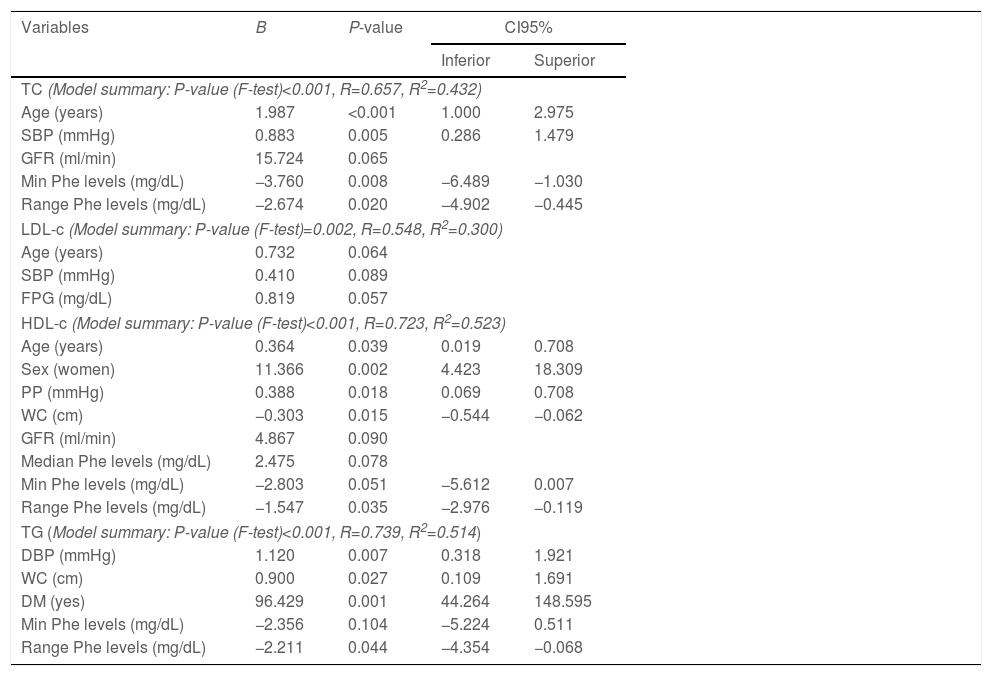Some studies have pointed to a relationship between Phenyketonuria (PKU) and an increased cardiovascular risk (CVR). This study aimed to evaluate the influence of metabolic control on classical CVR factors in adult patients with PKU.
Material and methodsIt was a cross-sectional study conducted in patients older than 18 years with a diagnosis of classical PKU and under strict dietary control. Demographic, epidemiological and laboratory variables related to CVR were collected. The variables of metabolic control were some parameters related to phenylalanine (Phe) plasma levels.
ResultsA total of 47 patients were included with a mean age of 36±10 years of which 30 (64%) were women. Multivariate analysis revealed that range Phe (B=−2.211, P=0.044, 95%CI: −4.354–(−0.068)) levels were within the model for triglyceride concentrations, while minimum (B=−2.803, P=0.051, 95%CI: −5.612–0.007) and range (B=−1.515, P=0.039, 95%CI: −2.945–(−0.084)) Phe levels were within the model for high-density lipoprotein cholesterol concentrations. Median Phe levels showed a stronger correlation with waist circumference (WC) (B=1.216, P=0.002, 95%CI: 0.462–1.969) than with body mass index (B=0.355, P=0.052, 95%CI: −0.004–0.714).
ConclusionsHigh Phe levels and wide Phe fluctuations were related to weight gain, increased WC and lipid profile abnormalities. Systematic CVR assessments and comprehensive monitoring of Phe levels may be desirable to prevent or delay cardiovascular disease in PKU patients.
Algunos estudios señalan una relación entre la fenilcetonuria (PKU) y riesgo cardiovascular (RCV). El objetivo de este estudio fue evaluar la influencia del control metabólico sobre los factores de RCV clásicos en pacientes adultos con PKU.
Material y métodosFue un estudio transversal en pacientes mayores de 18 años con diagnóstico de PKU clásica y bajo control dietético estricto. Se recogieron variables demográficas, epidemiológicas y de laboratorio relacionadas con RCV. Las variables de control metabólico fueron algunos parámetros relacionados con los niveles plasmáticos de fenilalanina (Phe).
ResultadosSe incluyeron 47 pacientes con una edad media de 36±10 años (64% mujeres). El análisis multivariante reveló que el rango de niveles de Phe (B=−2,211, p=0,044, IC 95%: −4,354; −0,068) se correlacionó con las concentraciones de triglicéridos, mientras que los niveles mínimos (B=−2,803, p=0,051, IC 95%: −5,612; 0,007) y el rango (B=−1,515, p=0,039, IC 95%: −2,945; −0,084) de Phe se correlacionaron con las concentraciones de colesterol ligado a lipoproteínas de alta densidad. La mediana de los niveles de Phe mostró una correlación más fuerte con el perímetro de cintura (B=1,216, p=0,002, IC 95%: 0,462; 1,969) que con el índice de masa corporal (B=0,355, p=0,052, IC 95%: −0,004; 0,714).
ConclusionesNiveles altos y fluctuaciones amplias de Phe se correlacionaron con el aumento de peso corporal, incremento de perímetro de cintura y anomalías del perfil lipídico. La realización de evaluaciones sistemáticas de RCV y un seguimiento exhaustivo de los niveles de Phe podrían ser favorables para prevenir o retrasar la enfermedad cardiovascular en los pacientes con PKU.










